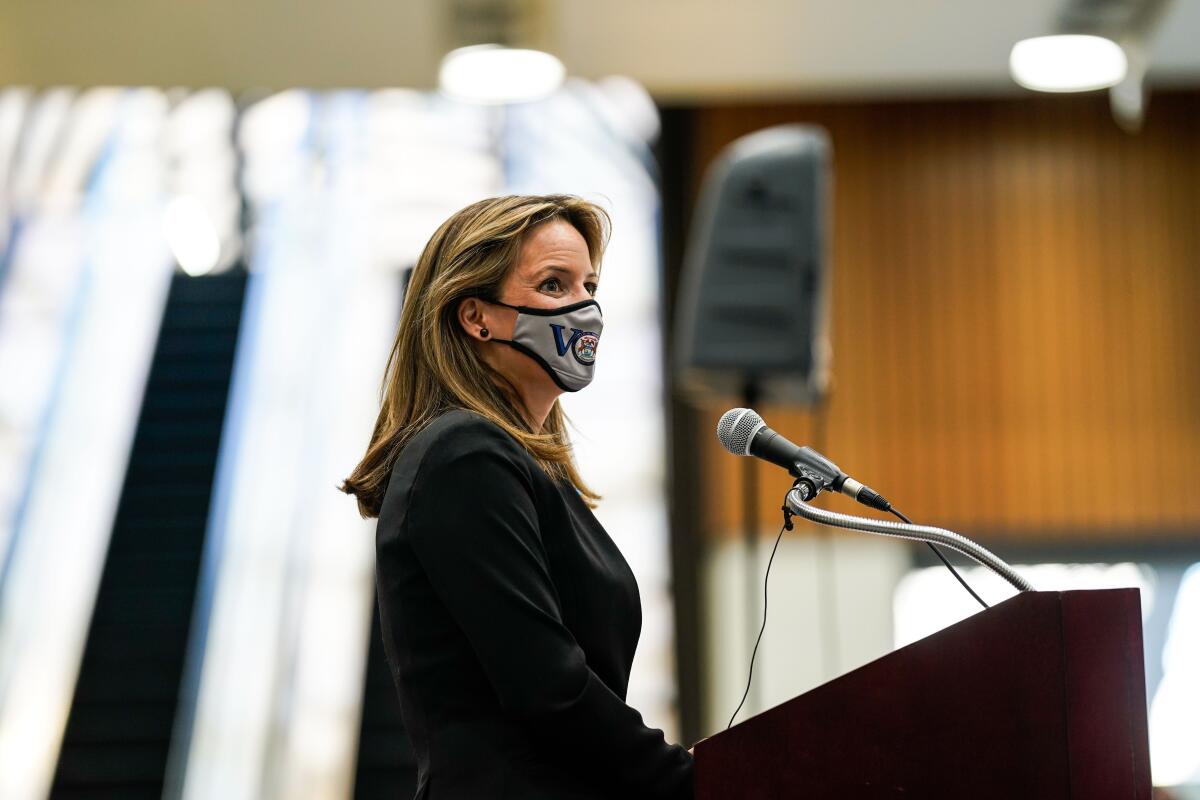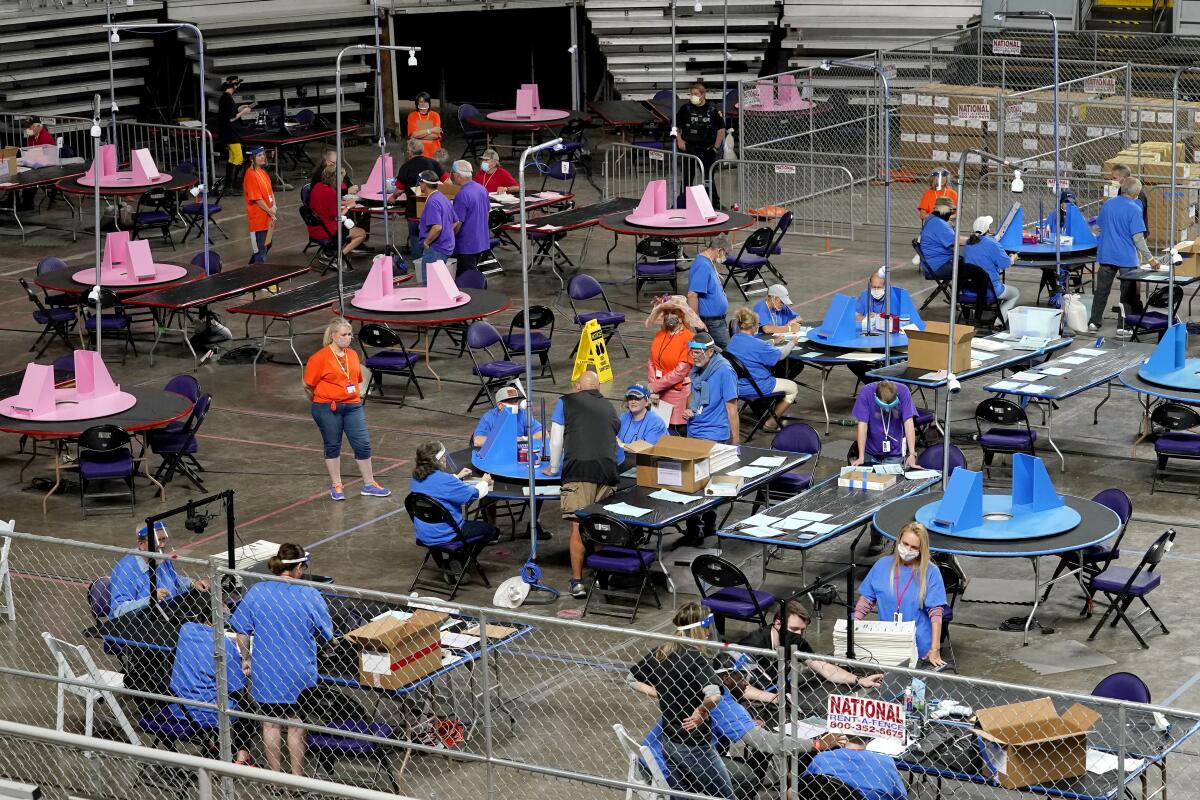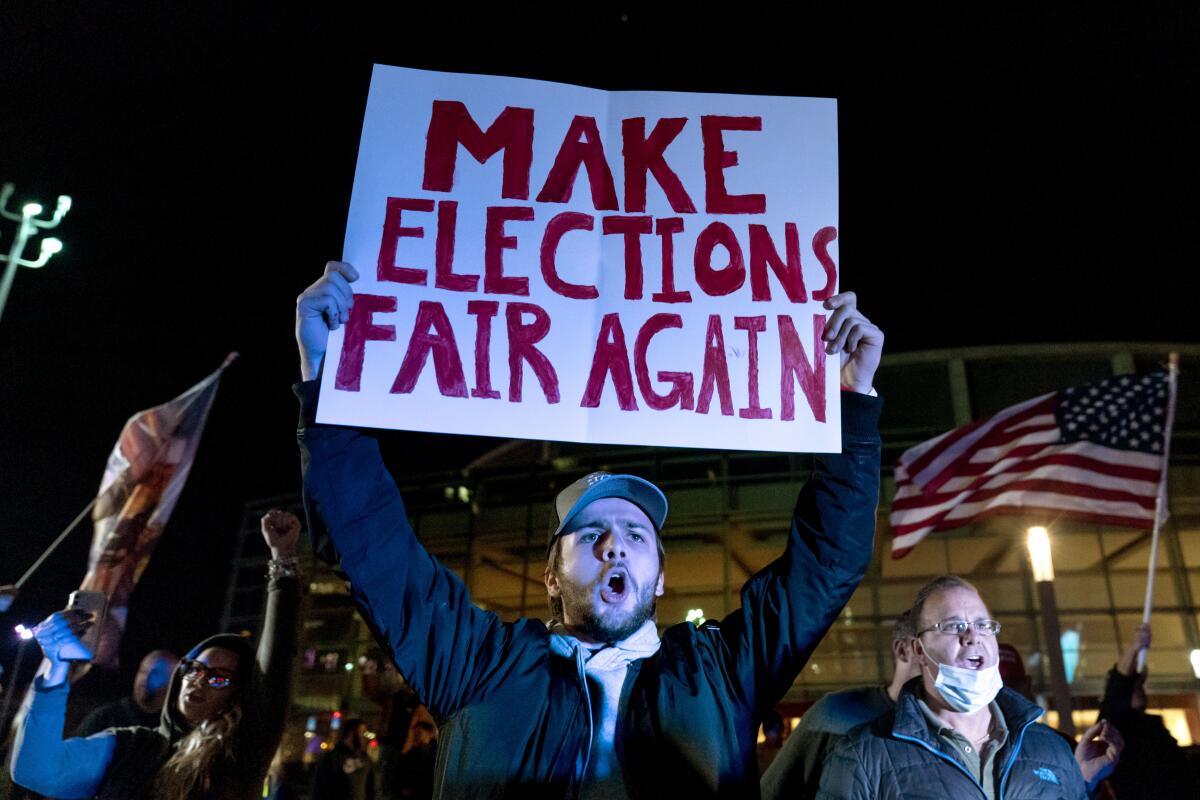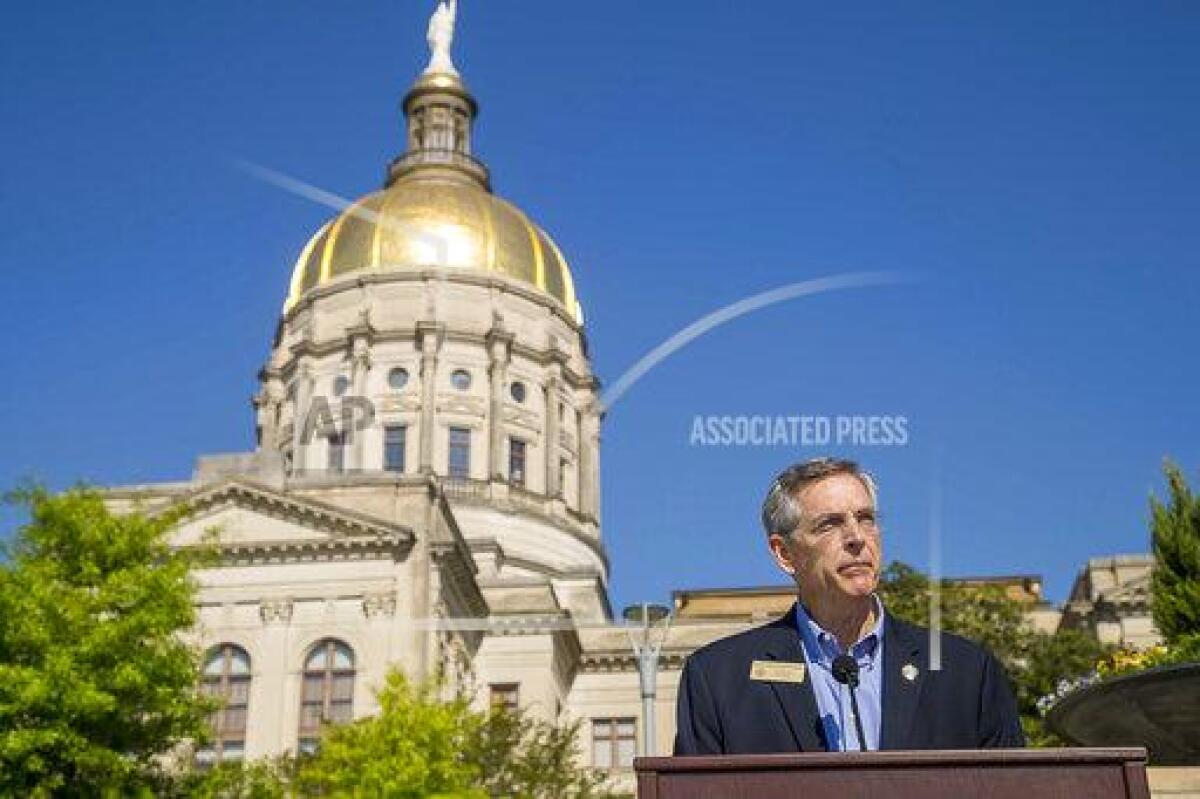State election officials survived Trump’s attacks. Will they survive the ballot box?

- Share via
WASHINGTON — Michigan Secretary of State Jocelyn Benson and her 4-year-old son were settling in to watch “How the Grinch Stole Christmas” after putting up Christmas decorations when dozens of protesters descended on her home in December 2020 chanting “Stop the Steal” and “We want an audit.”
Benson had been on the radar of President Trump and his allies since the spring, when he railed against her decision to send absentee ballot applications to all Michigan voters, calling her a “rogue Secretary.” But the late-night protest, marked by what she described at the time as “armed individuals shouting obscenities,” solidified her role as a central figure in the fight over control of American elections.
The stakes have increased heading into the 2022 midterm elections.
Democratic groups, donors and incumbents like Benson have raised record amounts to secure seats in battleground states, while Trump loyalists are running on his unfounded election fraud claims, challenging Democrats and Republicans like Georgia’s Brad Raffensperger in their bids to administer elections and sign off on the results.
“Secretaries of state are, in the battle over the future of our democracy, serving on the front lines,” said Benson, who is expected to soon announce her reelection plans, in an interview with The Times. “[C]learly the work that we did to successfully defend democracy in 2020 has placed us in a greater spotlight.”
Secretaries of state became household names in the last election as they worked to keep voters safe during the pandemic and debunk election misinformation spread by Trump and others. From Benson’s absentee ballot applications, to Raffensperger’s rejection of Trump’s request to “find 11,780 votes” — their decisions highlight the outsized role these officials increasingly play in elections.

Two dozen states will hold elections this fall to determine who oversees their elections. Trump has endorsed three candidates in those races, including a man seen outside the Capitol during last year’s Jan. 6 attack who has also acknowledged ties to the far-right Oath Keepers group.
He has also backed Kristina Karamo in Michigan, who rose to prominence in conservative media after claiming she saw fraudulent absentee ballot counting during the 2020 election. Karamo testified before a Michigan Senate committee investigating election fraud allegations, which found no evidence of widespread or systematic fraud in the state’s election.
Karamo did not return requests for an interview.
Early indicators suggest Benson has fundraising and name advantage. A recent poll showed her with a 14-point lead. She has also out-raised Karamo 7 to 1, collecting $1.6 million in 2021, compared with Karamo’s $228,000, according to recent campaign finance reports. Karamo has led fundraising among Republicans vying for the party’s nomination in April.
But Democrats say they don’t take those numbers for granted. “I anticipate the cost of running for secretary of state to more than double this year, because of that additional scrutiny,” Benson said. “What I’m grateful for is that more voters than ever before will be paying attention to these important races.”
The Democratic Assn. of Secretaries of State has beefed up its operations ahead of the 2022 elections, hiring its first full-time staffer last April, Executive Director Kim Rogers, and raising a record $4.5 million between the group and its affiliated organizations in 2021.
Rogers said the group is focused on protecting incumbent election officials in Michigan, Colorado, Minnesota and New Mexico, holding on to the open seat in Arizona — where another high-profile Democratic secretary of state, Katie Hobbs, is running for governor — and on potentially flipping Nevada and Georgia.
“We’ve always said that the states are the last line of defense,” Rogers said, adding that she expects interest in state-level politics to increase in the wake of last month’s failed effort to advance voting rights legislation in the U.S. Senate.
The Republican State Leadership Committee, which helps to elect Republicans to a range of down-ballot positions, including secretaries of state, raised $33.3 million in 2021, a $14-million increase from 2019.
“It’s up to us to stop them from continuing to erode public confidence in our elections and to support Republican secretaries of state in their efforts to make it easier to vote and harder to cheat,” RSLC communications director Andrew Romeo said in a statement to The Times.
If elected, Karamo and other Trump-backed candidates wouldn’t be able to unilaterally change election laws and procedures. The powers of the secretary of state are set by state constitutions and election laws, safeguarding against a secretary “going rogue,” said Rebecca Green, co-chair of the Election Law Program at William & Mary Law School.
And anything a secretary of state does can be challenged in court. Still, election officials wield significant power to interpret and implement the rules.
Benson’s decision to send absentee ballot applications ahead of the election helped lead to a record turnout of the state’s 7.7 million registered voters. Of the 5.5 million votes cast, nearly two-thirds were absentee ballots.
But a secretary’s greatest power might be their role as the face of a state’s election system. In the last two years they have increasingly been responsible for building trust in election processes and in those who administer them.
“Having the person who oversees elections fundamentally believe in the process and in democracy is a pretty important message right now,” said Rogers, of the Democratic secretaries group.
A January Quinnipiac poll found that 57% of voters surveyed said they did not believe that there was widespread voter fraud in the 2020 election. However, 71% of Republicans said they did believe there was widespread voter fraud.

Trump’s Save America PAC has made donations from $5,000 to $7,000 to his favored candidates in Arizona, Georgia and Michigan. He has brought Georgia Rep. Jody Hice and Arizona state Rep. Mark Finchem onstage to speak at recent rallies.
Finchem has acknowledged ties to the far-right Oath Keepers group and was seen outside the Capitol during last year’s Jan. 6 attack. He has also touted the audit of Maricopa County’s 2020 election results, though the review failed to find evidence of fraud, and recently co-sponsored legislation to give the Legislature the power to reject election results.
Hice, a former conservative talk show host, told Trump supporters at a Georgia rally in September that Raffensperger had “massively compromised the right of the people at the ballot box” and “opened wide the door for all sorts of irregularities and fraud to march into our election system.”
Raffensperger, meanwhile, has criticized Hice for challenging the certification of the presidential election but not his own reelection to Congress on the same ballot.
Trump’s endorsed candidates are part of a coalition of pro-Trump “America First” secretary of state candidates, according to Nevada’s Jim Marchant, a former Republican state representative running to lead elections there. Marchant received Trump’s endorsement in his failed congressional bid in 2020. Marchant sued unsuccessfully to request a new election, claiming he was a victim of voter fraud.
Marchant, who as of now has not been endorsed again by Trump, said allies of the former president encouraged him to forgo a second congressional campaign in favor of running to oversee elections and reaching out to like-minded candidates.
He compared the campaign to a now-defunct group launched by liberal activists in 2006 to help elect Democratic secretaries of state following losses in the 2000 and 2004 presidential elections that they blamed in part on Republican election officials. “We’re just learning from them, and we’re going to counter that,” he said.
The effort to elect Trump allies has coincided with a push by Republican lawmakers in several states to shift duties away from secretaries of state, give legislatures more power over elections, and introduce steep fines for election officials who make technical mistakes or send absentee ballot applications to voters.
In Arizona, lawmakers blocked Hobbs, the Democratic secretary of state, from representing the state in election cases. In Georgia, last year’s election overhaul replaced Raffensperger as the head of the State Board of Elections with a political appointee. The board now has power to take over local election boards.
The Georgia secretary has also suffered political consequences: a well-funded primary challenge from Hice and censure by the state GOP.

Although efforts to transfer power from election officials to lawmakers have been successful in Republican-controlled states, they have stalled in states with split government such as Michigan, where Democratic Gov. Gretchen Whitmer vetoed new voting laws from the GOP-held Legislature.
In response, conservative activists have launched petition drives, including one that would impose stricter voter ID laws, ban donations to local election offices and block local election officials from sending unsolicited absentee ballot applications. A second petition would create a powerful new board to audit election results, including the 2020 election.
The petitions need 340,000 valid signatures to advance to a vote in the Legislature. If passed, they cannot be vetoed.
As the 2022 midterms approach, Benson said she and her staff are meeting with voters to answer questions about election security, encouraging them to attend the testing of election equipment and volunteer to be poll workers.
The challenge of the 2020 election wasn’t administering it or tabulating the results, she said. It was anticipating the level of doubt, falsehoods and concerted efforts to overturn the results that followed.
“Though the 2020 effort to overturn a presidential election was a failure,” she said. “We should anticipate that future election subversion efforts will be more sophisticated, and strategic, and perhaps even successful.”
More to Read
Get the L.A. Times Politics newsletter
Deeply reported insights into legislation, politics and policy from Sacramento, Washington and beyond. In your inbox twice per week.
You may occasionally receive promotional content from the Los Angeles Times.











